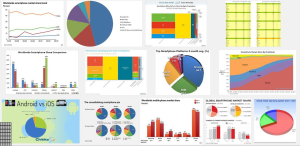Mark Twain once said, “There are lies, damned lies, and statistics,” [1] implying that statistics are the biggest lies of all. Statistics about market share are an important part of marketing. And measuring market share certainly depends on what you want to measure.
Companies depend on market-share statistics in two ways: First to use in advertising to brag about how popular their products are. In this case the company, of course, wants the most favorable numbers they can find. Second, companies want to know how they’re doing against competition to plan both future products and also future advertising campaigns. For this latter they want the most accurate numbers they can find. That’s not to say the advertising numbers are not accurate; rather they’re picked to make the company look good.
All this came to mind last night when I was watching an interview with two technology reporters from the Wall Street Journal. They said, “The PC is dead.” This statement is, of course, hyperbole; there is still a sizable demand for desktop and laptop computers. And I believe there always will be some demand for such devices among people who like to write (be it prose or software)–people like me. That demand may be greater among businesses than consumers, but those are both large markets.
It reminds me of when the iPad was announced. At the time I was employed by Amazon, working on the Kindle. My friends asked me, “isn’t the iPad going to kill the Kindle?” Of course it didn’t. And of course it did take some market share. Amazon came out with their own tablet, the Kindle Fire, and its sales outstripped the original Kindle. Amazon now brags that the Kindle Fire is Amazon’s biggest selling item. [2] Of course that’s another example of picking statistics to make a point, since, when pressed, Amazon admits that the Kindle Fire is only a small, small portion of their total sales. (They’re not saying how small.)
This also reminds me of a recent argument I had with one of my daughters about Apple vs. Google market share. (Disclaimer: I once worked for Apple.)
I claimed that iOS devices (iPhone and iPad) have more users than Android devices. [3] She countered that there are more Android phones sold than Apple phones. Of course one can find statistics to back either claim (as I did in the reference). Both are statistically correct. It all depends on how you frame the question.
This last point was well made by an article demonstrating that Linux has twice the market share of Windows. [5]
As this last reference points out in its subhead: Statistics are a matter of your viewpoint.
See also, “Lies, Damned Lies, and the Press“.
References:
[1] https://en.wikipedia.org/wiki/Lies,_damned_lies,_and_statistics
[3] http://www.netmarketshare.com/operating-system-market-share.aspx?qprid=8&qpcustomd=1
[4] http://royal.pingdom.com/2013/02/25/ginormous-android/ [This URL no longer works]
[5] http://www.tomshardware.com/news/linux-windows-microsoft-android-ios,20220.html

Things have changed somewhat since I wrote this post. Currently (https://gs.statcounter.com/os-market-share/mobile/worldwide) Android has far greater market share the iOS. Apple then began spinning this as “iPhone has more user than any other brand of smart phone”. This, however, is also no longer true: they have been surpassed by Samsung. (https://www.counterpointresearch.com/global-smartphone-share/)
Of course by the time you read this, these numbers may have changed again. (It may be that the links I have dynamically change with the data. Only time will tell on both questions.)